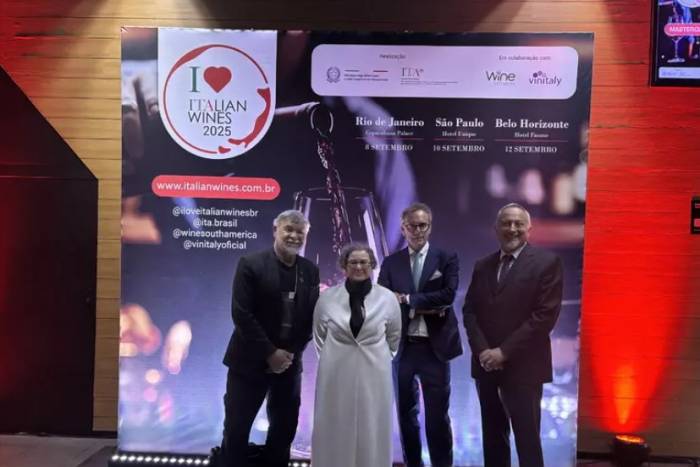
The “I love Italian Wines” event took place yesterday at the Hotel Unique in São Paulo, drawing 55 Italian wine producers and presenting more than 500 different labels to an audience of importers, distributors, and wine professionals. The gathering highlighted the growing interest in Italian wines within the Brazilian market and underscored Italy’s efforts to strengthen its presence in South America.
Domenico Fornara, the Consul General of Italy in São Paulo, addressed attendees by describing the shift in strategy for Italian exports. He explained that while South America—and Brazil in particular—has long represented a significant opportunity for Italian products, it has now become a strategic necessity. Fornara pointed to the need for market diversification and referenced the export plan promoted by Italy’s Foreign Minister Antonio Tajani as key factors behind this new approach.
Fornara also discussed the potential impact of the pending European Union-Mercosur agreement, which could soon enter its final phase. He said that ratification of this agreement would create even more favorable conditions for Italian agri-food exports, especially in the wine and gastronomy sectors. According to Fornara, these industries are vital for Italy’s economy.
Recent data supports this optimism. Over the past year, imports of Italian wine into Brazil have increased by 10 percent. Fornara emphasized that this growth signals untapped potential and noted that Italy is investing heavily to support its export sector. He described the “I love Italian Wines” event, organized with Verona Fiere and Milanez & Milaneze, as a practical tool to strengthen bilateral relations and help Brazilian importers discover the quality and diversity of Italian wines.
Milena Del Grosso, director of ICE (the Italian Trade Agency) in Brazil, spoke about the rapid development of the Brazilian wine market. She recalled that earlier editions of the event featured only a handful of exhibitors and regions. This year’s edition included 55 exhibitors, with 20 Italian companies still seeking local importers, and showcased over 500 labels representing a much broader range of wines. Del Grosso noted that while Italy is the world’s leading wine producer and exporter, it currently ranks only sixth among wine suppliers to Brazil. She said efforts are underway to improve this position.
Del Grosso also observed that Brazilian consumers are becoming more sophisticated and knowledgeable about wine, leading to increased demand for high-quality products. Over the past four years, Italian wine exports to Brazil have grown by an average of 10 percent annually despite existing tariffs. She added that if the EU-Mercosur agreement is ratified, growth could accelerate further.
The event featured guided tastings led by renowned critic Jorge Lucki. During his remarks, Fornara announced plans for the 14th edition of Italian Cuisine Week in São Paulo later this year. The initiative will bring 20 chefs—one from each region of Italy—to cook at 20 different restaurants across the city. The goal is to promote regional products, wines, and culinary traditions while highlighting Italy’s gastronomic diversity.
With Italian wine taking center stage and economic conditions improving for trade between Europe and South America, Italy is positioning itself not just as a supplier but as a strategic partner for Brazil. The country aims to deepen its ties with Brazilian consumers and businesses through events like “I love Italian Wines” and ongoing cultural initiatives focused on food and wine.

Dining and Cooking